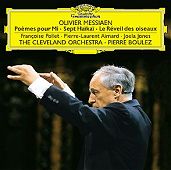Françoise Pollet; Joela Jones; Pierre-Laurent Aimard; Orquesta de Cleveland; Pierre Boulez.
Deutsche Grammophon 443478-2 [72'04"]

|
Olivier MESSIAEN: Poèmes pour Mi (1937); Sept Haïkaï (1962); Le réveil des oiseaux (1953). Françoise Pollet; Joela Jones; Pierre-Laurent Aimard; Orquesta de Cleveland; Pierre Boulez. Deutsche Grammophon 443478-2 [72'04"] |
 |
| Gramophone |
Since all the performances here are excellent, virtuoso indeed, and the recordings are first-class, this can be confidently recommended to any Messiaen enthusiast who happens to want these three works. But it would also make an ideal next step for anyone who has recently been bowled over by Turangalîla, say, or the Catalogue d'oiseaux, and wants to explore Messiaen methodically. For that listener the Poemes pour Mi would represent him at his most lyrically passionate and sensuous, the Reveil des oiseaux his «bird style» at its most intransigent (its thematic material, unlike the Catalogue, consists exclusively of bird-song, as bright and as hard-edged as possible), while the Sept Haïkaï stand both for Messiaen's love-affair with Asia and his attempts to convey vivid colour in music.
And in Francoise Pollet the Poemes get as close as any reading has to Messiaen's specification of a grand soprano dramatique as the ideal solo voice. Though not quite as stunningly precise as Jane Manning and without quite the range of quieter colours the songs sometimes demand, she has considerable reserves of power, she can be voluptuous when needed and is even better at dramatic declamation than Manning. She can sustain a long arch of melody splendidly and, assisted by Boulez's firm control, generates great rhythmic excitement in the fourth and ninth songs of the set. This latter quality gives exhilaration to Reveil des oiseaux, as the dawn chorus grows ever more vociferous, the tangle of exuberant melodies more complex; Aimard is glitteringly precise here. But it is the Sept Haïkaï that are most crucial to Messiaen's later development, with their pairs of movements reflecting each other, their searing saturated colours (the temple archway in the sea, lacquer-red against indigo!), their use of juxtaposed «refrains» and their central homage to the sound of a Japanese orchestra.
Boulez has expressed reservations about some of his great teacher's theories and attitudes, but evidently has few if any about the fantastic sound world imagined by his astonishingly precise ear.
|
|